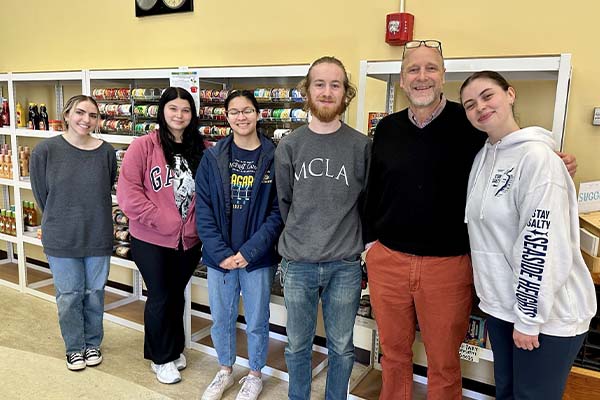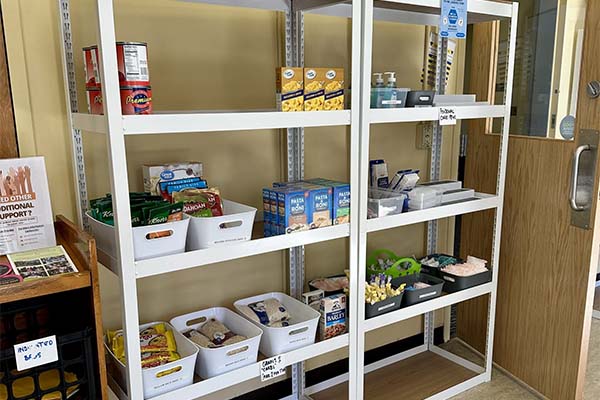MCLA Essential Needs Center Supports Students, Expands Access to Life-Changing Opportunities
July 9, 2025
The newly opened Essential Needs Center (ENC) at Massachusetts College of Liberal Arts (MCLA) is more than just a place to
grab a snack or hygiene products—it’s a hub for student support, a launchpad for opportunity,
and a reflection of MCLA’s commitment to student well-being.
The ENC builds on five years of groundwork to ensure that no student goes without
basic needs – growing from a small pantry to larger welcoming space in the Amsler Campus Center on the second floor. It is stocked with nonperishable food, household goods, clothes,
toiletries, and small appliances like a microwave and coffee machine. The ENC is overseen
by Assistant Dean of Student Growth & Well-Being Spencer Moser and is designed to
reduce barriers that interfere with student success.

“Being able to provide for students and alleviate those barriers means they can prioritize
their schoolwork,” said Tim Rasmussen ‘28, an ENC coordinator. “It does so much good
for the community.”
Rasmussen is one of eight students who staff the ENC. He got involved after meeting
Moser during orientation. Like many of his fellow staff members, Rasmussen not only
supports others through the ENC—he also benefits from the kinds of opportunities that
resource security makes possible.
Kaiya Cocliff ‘26, an ENC coordinator, has been involved with the ENC since it was
"just a closet.” “It’s my child,” she said. “Every day last year was a new opportunity.
Now, students come in and are so grateful. If they need something, we get it. I love
this place—I really do.”
As the center continues to evolve, it’s also helping lead broader conversations about
college food insecurity. MCLA is participating in the HOPE survey, a national initiative assessing basic needs insecurity among college students. The
data will inform collaboration with other institutions and shape sustainable, student-centered
support systems.

“It’s a financial investment but it will give us data that we absolutely need as we
move forward and help us design resources and steps to know what kind of demographic
that exists here on campus in terms of food insecurity,” Moser said. “What comes with
that is best practices and we can meet with experts in the field. We'll get our data
and we’ll be able to convene with other institutions in the same cohort that are facilitating
the survey at the same time.”
The ENC is made possible through a combination of funding streams: state grants, MCLA
departmental budgets, generous donors through the Office of Institutional Advancement,
and contributions from alumni and the greater community. The center is also a member
of the Food Bank of Western Massachusetts, and anyone is welcome to donate supplies.
Beyond resources, the ENC builds community. Through Instagram features like “Meet the Staff,” volunteer opportunities, and on-campus events, the
ENC creates a space where students feel seen and supported.
The ENC will remain open and accessible through the summer continuing its mission
to support student success, dignity, and opportunity—one meal, supply, or kind interaction
at a time.
